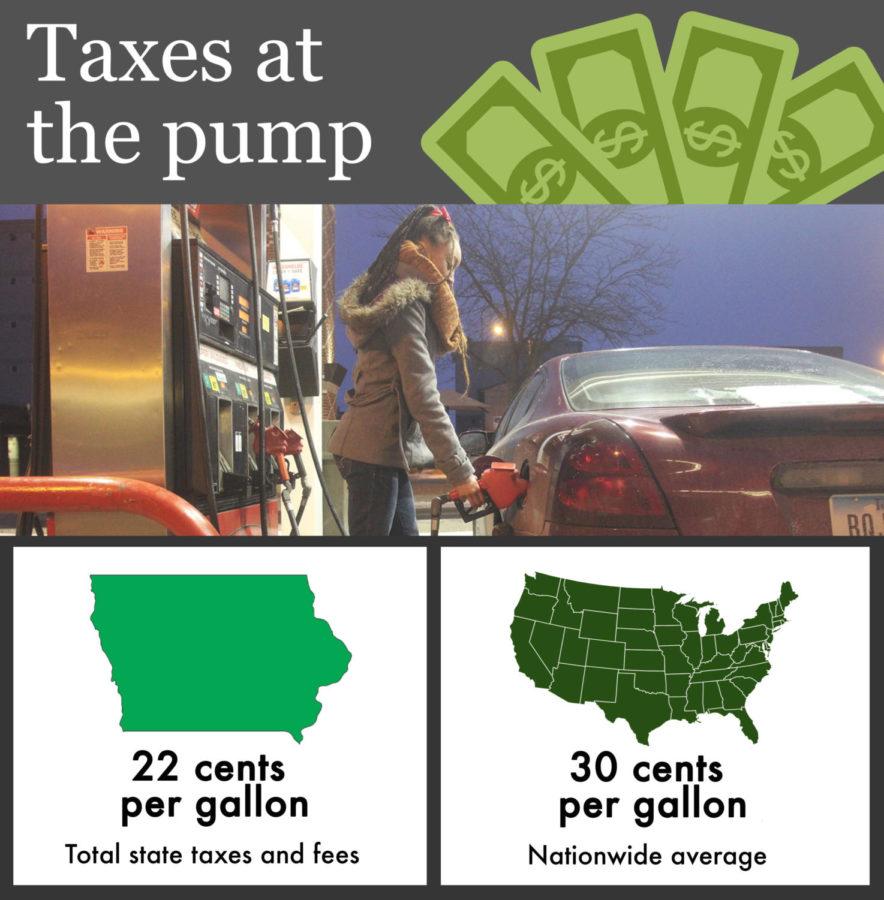Iowa legislature approves 10-cent gas tax increase
Richard Martinez/Iowa State Daily
Gov. Terry Branstad is proposing an increase in the Iowa gas tax. State taxes and fees for gasoline are used to fund state transportation expenses such as road construction and improvements. Due to lowering gas prices and the high demand to improve Iowa’s roads, Branstad anticipates an increase in state taxes and fees for gasoline.
February 24, 2015
Iowa lawmakers gave the green light to a 10-cent increase in the state’s gasoline tax Tuesday, a move supporters say will clear up an almost $215 million shortfall in funding for state infrastructure.
The Iowa Senate first approved the measure Tuesday morning, voting 28-21 to pass the measure. The bills passage came with support from both Democrats and Republicans in the upper chamber, but also faced some backlash from members of each party.
In total, 16 Democrats and 12 Republicans voted in favor, while 10 Democrats and 11 Republicans voted against the bill.
The 10-cent increase amounts to about a 45 percent increase in the current tax. It would raise about $200 million dollars in the first year. The increase comes after the Iowa Department of Transportation estimated a $215 million shortfall in funding to maintain Iowa roads and bridges.
State Sen. Tod Bowman, a Democrat from Maquoketa and chairman of the Iowa Senate Transportation Committee, spoke in favor of the bill before its passage, saying the bill would increase funding, which in return would make Iowa’s roads safer and improve Iowa’s economy.
“Good roads and bridges are key to Iowa’s economic growth and prosperity,” Bowman said. “Business leaders say bad roads are one of Iowa’s most serious economic development weaknesses.”
“We can’t continue to kick this can down the road,” Bowman added.
Opponents of the bill offered a series of amendments, including state Sen. Brad Zaun, R-Urbandale, who offered an amendment that would divert state general funds to pay for roads. His proposal was ruled not relevant to the debate.
Zaun said that the tax would do little and that the legislature would be back in 10 years to raise the tax again.
State Sen. Jerry Behn, R-Boone, blasted what he called “ridiculous” waste in spending related to roads and bridges.
Behn offered examples of strings attached to federal money, including new rest stops along Interstate 35 just north of Ankeny, which were required to be built when Iowa received federal dollars. He also mentioned “decorative” lights put up on Highway 30 near Ames.
State Sen. Herman Quirmbach, D-Ames, who is also an economics professor at Iowa State, voted in favor of the increase.
The Iowa House passed the bill later Tuesday on a 53-46 vote.
Debate in the House was similar, with several amendments offered to alter the bill, but the final passage was the same as the Senate passage.
State Rep. Josh Byrnes, a Republican from Osage who chairs the House Transportation committee, spoke just before the final passage in support of an increase.
“My constituents want this,” Byrnes said. “I honestly feel we’re doing the right thing today.
State Rep. Chuck Soderberg, R-Plymouth, voted against the bill and spoke out against the increase.
“Granted, we have not raised the tax for a number of years, “ Soderberg said. “But to go from the 15th cheapest state, fuel wise, to the 13th most expensive with one bill, should be a wake up for everybody.”
Ames’ Reps. Lisa Heddens and Beth Wessel-Kroeschell, both Democrats, voted in favor of the increase.
The increase passage comes the same day as an “Infrastructure Report Card” for Iowa was released. The Iowa Section of the American Society of Civil Engineers gave Iowa a C- overall in their report card. Iowa roads received a C-, while bridges received a D+.
The report also noted that “1 in 5 of Iowa’s bridges is rated structurally deficient or posted with weight restrictions — ranking third highest in the nation.”
Iowa’s gasoline tax was last increased in 1989. The current tax is somewhere between 18 and 24 cents, depending on which fuel you purchase.
The bill now heads to Gov. Terry Branstad’s desk, where he is expected to sign the tax increase into law.
The increase will take effect the following month after it is signed.







